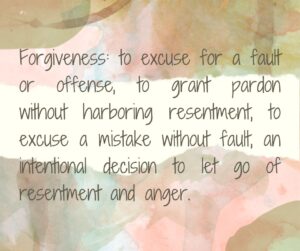We hear forgiveness in the Lord’s Prayer. We hear forgiveness in our creed. We hear about forgiveness in our confession
What is forgiveness? The dictionary says, to excuse for a fault or offense, to grant pardon without harboring resentment, to excuse a mistake without fault, an intentional decision to let go of resentment and anger. The Greek word translated as forgiveness means “to let go.”
Forgiveness is in many ways a learned behavior. We learn how to forgive. We learn to value it or not. We can also learn other lessons about forgiveness. Some people hold righteous anger. They bear a grudge for decades.
When Jesus taught his disciples how to pray, part of his model prayer involves a plea for forgiveness. “Forgive us our debt, as we also have forgiven our debtors.” Jesus says, “For if you forgive others their trespasses, your heavenly Father will also forgive you; but if you do not forgive others, neither will your Father forgive your trespasses.”
Our hearts need to be soft, not hard. Receiving forgiveness is meant to soften our hearts. It breaks up the hardness so that grace can seep in deep. God desires that our hearts become soft soil where the seed of forgiveness brings about a healing and reviving. It creates a peace that passes understanding.
When it comes to role models, the greatest model we have for forgiveness is our Lord Jesus Christ. The first seed of forgiveness was planted by God. It was planted into the soil at Gethsemane. There, on his cross, Jesus bestowed forgiveness on all of us. “Father, forgive them, he said, “They don’t know what they’re doing.”
Our debt has been forgiven. Let it fill you and forgive as God forgives.




